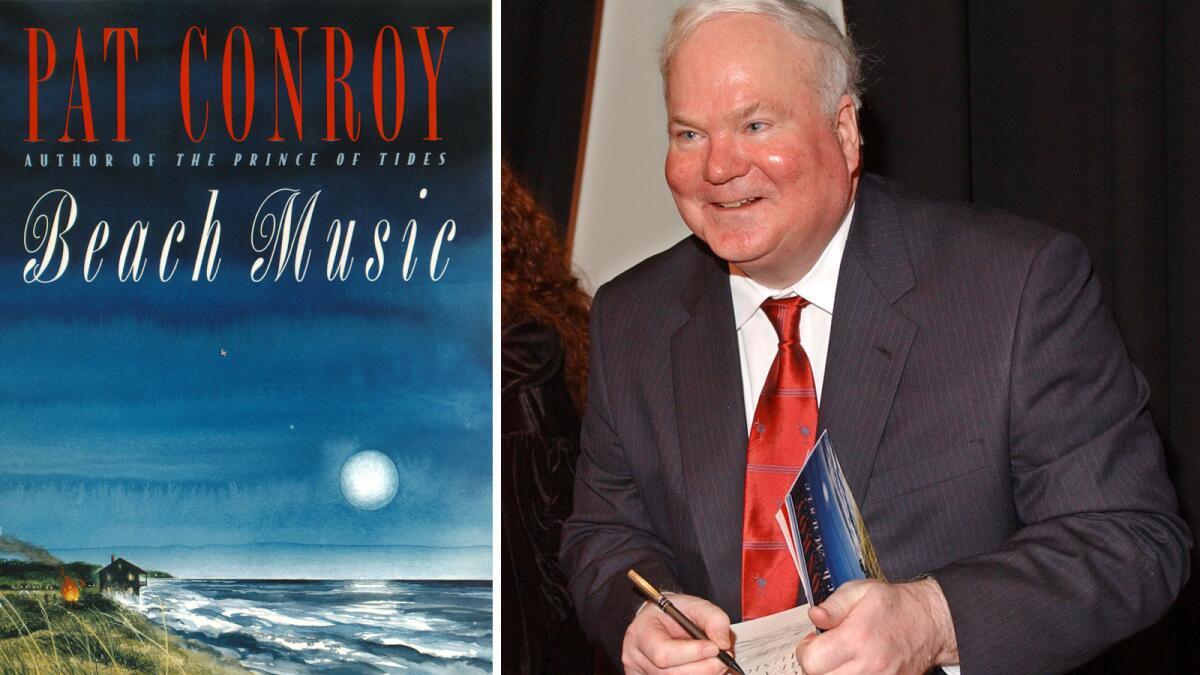From the Archives: Pat Conroy’s books capture his personal pain, and ‘Beach Music’ is no exception

The cover of “Beach Music,” published in 1995. At left, Pat Conroy attends a benefit reading in February 2002 in New York.
- Share via
Editor's note: This review of the novel "Beach Music" was originally published in The Times on June 27, 1995. Pat Conroy, 70, died Friday in Beaufort, South Carolina.
A glint of the pugilist's wariness lights his eye . . . a whisper of the blarney husks his voice. Looking for all the world like a battle-scarred Irish saloon brawler in his work-worn khaki pants and a wash-faded yellow cotton T-shirt, best-selling author ("The Prince of Tides") Pat Conroy brushes aside a major literary magazine review of his new novel, "Beach Music," with a mistrusting glance.
"I never read my reviews . . . not even the good ones. Barbra Streisand once told me, if just one person in the audience doesn't applaud, it bothers her. I'm the same way. I'd be devastated to read that someone didn't like my work."
Relaxed, but unsmiling, Conroy has every reason to be happy for a change. Preceded by extravagant praise, his long-overdue novel has already sold the entire 750,000-copy first printing and is a virtual shoo-in to top the bestseller list the moment it ships to local bookstores this week.
It has been nine years since "The Prince of Tides." Now, he sits and ponders why this one malingered a full six years past the publisher's deadline.
"To begin with, there was the one problem I never thought I'd have. I don't think anyone was prepared for the awesome success of 'The Prince of Tides.' I felt the numbing pressure that is visited upon you following great success.
"Writing has never been that simple for me. The new plot deals with my mother's death . . . I was distracted by the filming of 'The Prince of Tides' . . . my brother Tom committed suicide . . . and my marriage wasn't going all that great.

"Besides all that, Nan [editor-publisher Talese] was afraid if I wrote 'Beach Music' in the first person, it would read like a continuation of the Tom Wingo persona from 'The Prince of Tides,' so she insisted that I write 'Beach Music' in the third person. . . . For me, that was like exploring a foreign territory. When I did finally finish the manuscript, it became obvious to everybody that we should move back to the first-person narration by the hero, Jack McCall."
All this notwithstanding, most Conroy faithful will agree that "Beach Music" (Nan A. Talese / Doubleday) has been well worth the wait.
Peopled with a cast of brutally sociopathic father figures, landscaped with gnarly family trees and richly embroidered with poetic images, "Beach Music" is, unmistakably, vintage Conroy.
The novel opens with the suicide of McCall's beautiful wife. Enmeshed in grotesque family dysfunction and haunted by a poignantly autobiographical account of his mother's death from leukemia, McCall finds himself tangled in cobwebbed secrets of the Holocaust and Vietnam.
Conroy's sixth book transports the reader from the malodorous canals and cobbled alleys of Italy to the creeks and moss-canopied country roads of South Carolina, overflowing with the author's longstanding love / hate for the South and his anguished, bittersweet memories of his youth.
Conroy's books are so wedded to this sea island region of South Carolina that most readers assume he was born here.
"I'll always consider this home. I was 15 in 1960, when my father--[model for] 'The Great Santini'--was assigned to the Beaufort Marine Air Station. At the time, I had already lived at 23 different addresses and attended 12 different schools. I attached myself to Beaufort like a barnacle to the bottom of a ship."
*
I'll always consider this home. ... I attached myself to Beaufort like a barnacle to the bottom of a ship.
— Pat Conroy, on the sea island region of South Carolina
Conroy was offered a choice of several basketball scholarships in high school. Under pressure from his disciplinarian father, he chose the Citadel in Charleston.
Following graduation, he returned to Beaufort in 1967 and took a job teaching high school. Afire with indignation over the firing of Lt. Col. Nugent Courvoises, a beloved Citadel faculty member known affectionately as "The Boo," Conroy wrote a memoir protesting the act. With the colonel's assurances that he could sell 500 copies, in 1970 Conroy had it self-published with $1,500 borrowed from a bank--"The worst book in the English language," Conroy says now.
As a rookie teacher, Conroy witnessed the pain of the first black students integrated into the all-white Beaufort schools. In 1968, Martin Luther King Jr.'s assassination affected him deeply. Almost overnight he became a zealous convert for civil rights and lobbied successfully for black studies curriculum. After a year of attempts to join the Peace Corps, he seized an opportunity to teach black children on isolated Daufuskie Island.
He was fired from the Daufuskie job in fall of 1970 by the bigoted school superintendent because, symptomatic of many other things, Conroy and his new bride had kept some black children in their home overnight and because Conroy strenuously objected to his boss's favorite epithet for the kids.
In 1972, he wrote "The Water Is Wide," an intensely personal account of the Daufuskie fiasco.
"Someone gave me the name of Julian Bach, an agent in New York. I had written the book in longhand, so my wife rounded up a list of friends and each agreed to type a chapter. The chapters came back on onionskin, yellow paper, long paper, short paper. Some used pica type, some used elite. It was hilarious. When Bach got it he thought he had L'il Abner in his stable. . . .
"Later, he called me and said, 'How's $7,500 sound to you?' I told him it had only cost me $1,500 to get 'The Boo' published. I could hardly believe it when he said, 'No, no, Pat--Houghton Mifflin wants to pay you. ' "
"The Water Is Wide" won the Anisfield Wolfe Award for its contribution to race relations. In 1974, it was made into the film "Conrack," starring Jon Voight.

Predictably, the Beaufortonian aristocrats--stung at seeing themselves portrayed on the big screen as narrow-minded rednecks--relegated Conroy to social leper. For 20 years Conroy has wandered from Beaufort to Atlanta to Italy and back, onto San Francisco and, lately, back to Beaufort.
Beginning with the movie "Conrack," all his books--"The Great Santini" (1976), "The Lords of Discipline" (1980) and "The Prince of Tides" (1986)--have been made into successful films.
Bidding for "Beach Music" reportedly has already topped $5 million; Conroy will write the screenplay.
Over the years, much has been written about his father's denial of the way his son portrayed him in "The Great Santini." But time seems to have softened Col. Conroy, who has retired to Atlanta. Nowadays, "When I do a book signing, Dad sits up right beside me. He gets a great kick out of signing himself as 'The Great Santini.' "
*
Outwardly Conroy's manner exudes forgiveness, but there is little evidence of it in "Beach Music." The novel has not just one, but two male characters who have been scarred by abusive fathers, and three screwed-up families.
"I loved my parents . . . but that can never change the fact that my father's violence ruined my childhood." He shrugs.
Conroy remains basically mistrusting of the South Carolina coast, where the past continues to haunt him in unexpected ways.
His novel "The Lords of Discipline" drew heavily on his experience of being at the Citadel when the all-white military school was forced to admit its first black cadet. Lately, the Citadel has been fighting just as hard against accepting Shannon Faulkner as its first female cadet.
"If a female Russian cosmonaut and a male American astronaut can figure out how to go to the bathroom in space," Conroy says, "surely the Citadel can figure this out."
ALSO
Manager: Joey Feek, of country duo Joey + Rory, dies at 40
An edgy take on Internet fame vs. Hollywood fame: "Surveys" by Natasha Stagg
In 'The Violet Hour,' Katie Roiphe looks at five great writers shuffling off this mortal coil
Start your day right
Sign up for Essential California for the L.A. Times biggest news, features and recommendations in your inbox six days a week.
You may occasionally receive promotional content from the Los Angeles Times.




